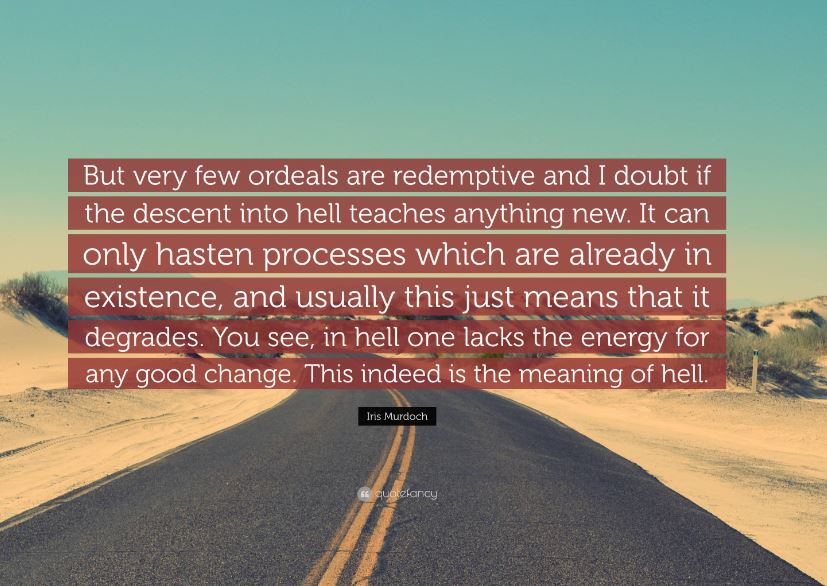The Redemptive Self
If I Can Do It So Can You - Fact Or Fantasy?
Focus on things you can control. Use the power of framing. Apply the law of response and outcome

The Redemptive Self - Overview
"The Redemptive Self" is the book, authored by Professor Dan P. McAdams, that coined the phrase.
McAdams has been at the forefront of efforts to apply narrative theory to the study of personality psychology.
Narrative Theory
During the 1980s, a number of psychologists developed and attempted to apply the concepts of narrative theory to show how people construct their identities through storytelling.
This description of human development and thinking processes proposes that we construct our life stories from personal and cultural materials that we have absorbed during childhood. According to the theory, we start to construct our personal narrative during adolescence as we begin to develop our individual sense of identity as a person.
A Very American Story
According to James M. Nelson in his review in 'The Cresset'
"Stories of redemption are some of the most powerful ways to express American identity and all that it can entail, from pain and anguish to joy and fulfillment.
Psychologist Dan P. McAdams examines how these
narratives, in which the hero is delivered from suffering to an enhanced
status or state, represent a new psychology of American identity, and
in turn, how they translate to understanding our own lives."
But do they?
Fact Or Fantasy?
How transferable are these narratives into other ethnicities, countries and cultures?
Can anyone achieve a redemption story?
In his review Nelson says that McAdams concedes:
"...there may be a negative side to these beloved stories of redemption..."
"Through no fault of their own, many Americans [and citizens of innumerable other countries] cannot achieve this revered story of deliverance."
"Instead, their lives are rife with contaminated plots, vicious cycles of disappointment, and endless pitfalls."
Story Or Myth?
In
my view the operative word in all this social theorising about the
redemptive self is "story" and a more realistic word would be "myth".
In the correct sense of the word, a “myth” is a story or narrative not
intended to be taken literally. The purpose and meaning of the narrative lies in the truth to which it points.
This may a “Truth” with a capital “T” to position it as a universal Truth or, as in this case, a partial truth.
Failure Is The Norm
Partial truth, as contained in the myths of personal narratives, have a useful role to fulfill - but it is wide of the mark to suggest or imply that: "If I can do it so can you".
Why do I say this? Why am I bursting this bubble?
These Successful People With Their Personal Narratives Of Redemption Are Outliers
The real Truth here is that failure is the norm.
We discussed this in some depth in How To Win Without Succeeding in the section on "Understanding Our Forgotten Failures":
- Winners are not the norm
- Winners are outliers
- We are prone to cognitive distortions e.g. survivorship bias
- We ignore the base rate data
- We confuse co-incidence and causation
- We craving a credible and coherent success story
- We have an Inflated perception of our chances of success
Redefining The Redemptive Self
An Alternative View
I want to propose an alternative and what I believe to be a more realistic and holistic view:
- That there is no single all encompassing narrative, but instead there is an continuum of experiences to each of which you have a choice as to how you will respond.
- That you build your own personal redemptive experiences upon a raft of partial truths and insights gained from these responses.
- It is the cumulative and compounding effect of these responses that ultimately shape your destiny.
- That the source of inspiration, creativity and power that fuels these responses can transcend the egoic self and can be drawn from your higher self or consciousness.
- That the generative sharing and transmission of these experiences is based on the toolkit of resources, information, tools and techniques that you have personally found to be useful and effective.
How do you do this?
[1] By understanding and using the power of framing
[2] By understanding the true location of your redemptive self.
[1] The Power Of Framing

- Focus on things you can control, ignore the rest - What this means is that whilst you may have no control over what happens to you, you DO have control over your response to what happens.
- Use the power of framing and change the way you look at things. How you mentally characterize a situation has a profound impact on how you respond to it emotionally.
- Apply the law of response and outcome - The outcomes that you experience are determined by your responses to the events in your life. This can be expressed as: Outcome = Event x Response. The strength and quality of your response is determined by the skills and the experience you bring to it. The stronger your response - the better the outcome.
[2] The True Location Of Your Redemptive Self

- My major criticism of the Redemptive Self as presented in narrative theory is that it is a construct of the ego. The ego can be likened to our own internal Window 10 operating system, and as such because its role is to control, it thinks it does (or should) control everything - which is non-sense and leads to a very limited perspective.
- Your higher self is the true source of your power, creativity and redemption. Think of your higher self as your hardwired portal to the universe and everything "out there" – or the dimension of spirituality or consciousness.
- Learn how to engage and build relationship with consciousness. The gateway to engaging with consciousness is not through the conscious
mind and it does not involve your ego. It all starts with some form of
inner prompting. This is felt in your heart not your head. The late Dr Wayne Dyer saw consciousness as beyond neutral and full of intention. In his
spiritual world view people who are connected to consciousness live
their lives on purpose and by intention in a co-creative relationship
with consciousness.
The Redemptive Self - Closing Thought
"The journey to Consciousness does not consist in arriving at a new destination where a person gains what he did not have, or becomes what he is not. [Aldous Huxley]
It consists in the dissipation of one’s own ignorance concerning one’s self and life, and the gradual growth of that understanding which begins the spiritual awakening.
The finding of Consciousness is a coming to one’s self."
Further reading:
What Is My Life PurposeIntroducing "The Balanced Toolkit" Approach To Life
Critique of Narrative Theory:
Let's Ditch The Dangerous Idea That Life's A Story
Return from "The Redemptive Self" to: The Meaning Of Life
LATEST ARTICLES
Master The Season You Are In - The Key to Fulfilling Your Purpose
 To fulfil your purpose, you must first master the season you are in. One of the biggest mistakes you can make in life is focusing all your energy on the next season instead of learning to master the s…
To fulfil your purpose, you must first master the season you are in. One of the biggest mistakes you can make in life is focusing all your energy on the next season instead of learning to master the s…The Inner Weight of Shame - Sustained By Attentional Fixation
 A Mind That Is Continuously Engaged In Self-Surveillance. Shame is one of the heaviest inner burdens a human being can carry. It does not announce itself loudly or demand attention through drama. Inst…
A Mind That Is Continuously Engaged In Self-Surveillance. Shame is one of the heaviest inner burdens a human being can carry. It does not announce itself loudly or demand attention through drama. Inst…Does Prayer Work? The Psychology of Prayer, Meditation and Outcomes
 Reality Is A Complex System Of Countless Interactions - Including Yours. So does prayer work? The problem is that the question itself is usually framed in a way that guarantees confusion. We tend to a…
Reality Is A Complex System Of Countless Interactions - Including Yours. So does prayer work? The problem is that the question itself is usually framed in a way that guarantees confusion. We tend to a…Living in Survival Mode Without Surrendering Mental Authority
Living in Survival Mode Without Surrendering Mental Authority
 Clear Thinking When You’re Just Trying to Stay Afloat. Many people today are overwhelmed because they are living in survival mode - not temporarily, but as a persistent condition of life. For many, th…
Clear Thinking When You’re Just Trying to Stay Afloat. Many people today are overwhelmed because they are living in survival mode - not temporarily, but as a persistent condition of life. For many, th…Manifestation Without Magic: A Practical Model
 Manifestation without magic is not a softer or more intellectual version of popular manifestation culture. It is a different model altogether. Popular manifestation teachings tend to frame reality as…
Manifestation without magic is not a softer or more intellectual version of popular manifestation culture. It is a different model altogether. Popular manifestation teachings tend to frame reality as…Staying Committed When You Can't See Progress - The Psychology of Grit
 Uncertainty Is Not The Absence Of Progress, Only The Absence Of Reassurance. One of the most destabilising experiences in modern life is not failure, but uncertainty and staying committed when you can…
Uncertainty Is Not The Absence Of Progress, Only The Absence Of Reassurance. One of the most destabilising experiences in modern life is not failure, but uncertainty and staying committed when you can…The Battle For Your Mind - How To Win Inner Freedom In A Digital Age Of Distraction
 From External Events to Inner Events. We often think of “events” as things that happen out there: the traffic jam, the rude comment, the delayed email reply. But what truly shapes our experience is wh…
From External Events to Inner Events. We often think of “events” as things that happen out there: the traffic jam, the rude comment, the delayed email reply. But what truly shapes our experience is wh…How to See Your Thoughts Without Becoming the Story
 A Practical Guide to Thought-Awareness. You can spend your life inside the stories of your mind without ever learning how to see your thoughts clearly and objectively. Most of the stuff we tell oursel…
A Practical Guide to Thought-Awareness. You can spend your life inside the stories of your mind without ever learning how to see your thoughts clearly and objectively. Most of the stuff we tell oursel…The Collison Decision Matrix - A Simple Framework for Better Choices
 The Collison Decision Matrix Is A Practical Everyday Thinking Tool. Most of us spend a surprising amount of time worrying about decisions. From small ones such as what to wear, what to eat, what to te…
The Collison Decision Matrix Is A Practical Everyday Thinking Tool. Most of us spend a surprising amount of time worrying about decisions. From small ones such as what to wear, what to eat, what to te…The Power Of Asking The Right Question
 The Power Of Asking The Right Question Lies In The Quest For Insight. To experience the power of asking the right question you must develop the practice of asking questions. The best way to improve th…
The Power Of Asking The Right Question Lies In The Quest For Insight. To experience the power of asking the right question you must develop the practice of asking questions. The best way to improve th…Site Pathways
 Here is a site pathway to help new readers of Zen-Tools navigate the material on this site. Each pathway is based around one of the many key themes covered on this site and contain a 150 word introduc…
Here is a site pathway to help new readers of Zen-Tools navigate the material on this site. Each pathway is based around one of the many key themes covered on this site and contain a 150 word introduc…